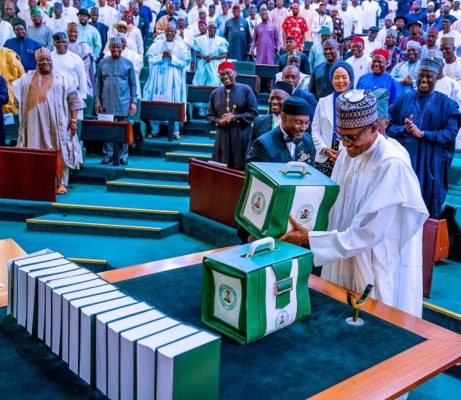President Muhammadu Buhari on Tuesday presented the 2020 appropriation bill of N10.33 trillion to the National Assembly with the Federal Ministry of Transportation getting the third highest allocation of N123 billion.
The Federal Ministry of Works and Housing got the highest allocation among the ministries with N262 billion, followed by Ministry of Power which got N127 billion.
The Federal Government’s Social Investment Programmes (SIP) including the N-Power scheme and the school feeding initiative among others got N30 billion while the ministry of Niger Delta affairs got least budget allocation of N24 billion.
The Presidential Amnesty Programme, which is managed by the President’s office, was allocated N62 billion.
The appropriation bill also comprises statutory transfers of N556.7 billion, non-debt recurrent expenditure of N4.88 trillion and N2.14 trillion of capital expenditure.
President Buhari, while presenting the budget to the lawmakers, said the Federal Government hopes to spend a total of N2.46 trillion on capital projects during the 2020 fiscal year, inclusive of N318.06 billion in statutory transfers.
“Although the 2020 capital budget is N721.33 billion (or 23 percent) lower than the 2019 budget provision of N3.18 trillion, it is still higher than the actual and projected capital expenditure outturns for both the 2018 and 2019 fiscal years, respectively,” he said.
The President said the emphasis of the 2020 budget will be the completion of as many ongoing projects as possible rather than commencing new ones.
“MDAs have not been allowed to admit new projects into their capital budget for 2020, unless adequate provision has been made for the completion of all ongoing projects.
“Accordingly, we have rolled over capital projects that are not likely to be fully funded by the end of 2019 into the 2020 budget. We are aware that the National Assembly shares our view that these projects should be prioritised and given adequate funding in the 2020 Appropriation Act,” he said.
The 2020 appropriation bill is proposed based on the planned increase of the VAT rate from 5% to 7.5%, while the overhead costs are projected at N426.6 billion.
Buhari said the additional revenues would be used to fund health, education and infrastructure programmes, with 85 percent going to states and local governments.
“Additionally, our proposals also raise the threshold for VAT registration to N25 million in turnover per annum, such that the revenue authorities can focus their compliance efforts on larger businesses,” Buhari said, adding that this is “to enable proper growth of MSMEs”.
Buhari said some of the items which will be exempted from the VAT, in addition to pharmaceuticals, educational items, and basic commodities already excluded by the VAT act, include brown and white bread, cereals, fish of all kinds, flour and starch meals. Others are fruits, vegetables, roots (yams etc), herbs, salt, milk, meat and water.
The appropriation bill further proposes a budget deficit of N2.18 trillion in 2020, including drawdowns on project-tied loans and the related capital expenditure.
According to President Buhari, “This represents 1.52 percent of estimated GDP, well below the 3 percent threshold set by the Fiscal Responsibility Act of 2007, and in line with the ERGP target of 1.96 percent.”
The President also said that the Federal Government would set aside N2.45 trillion for debt service during the 2020 fiscal year, out of which 71 percent is to service domestic debt which accounts for about 68 percent of the total debt. He said there is an expected GDP growth of 2.93% in 2020 to be driven by non-oil output, as economic diversification accelerates with inflation expected to remain slightly above single digits in 2020.
President Buhari also said that he had directed the stoppage of the salary of any Federal Government staff that is not captured on the Integrated Payroll and Personnel Information System (IPPIS) platform by the end of October 2019.
The platform was set up to manage personnel costs and weed out ghost workers.
“All agencies must obtain the necessary approvals before embarking on any fresh recruitment and any contraventions of these directives shall attract severe sanctions,” the President stated.
Copyright Ships & Ports Ltd. Permission to use quotations from this article is granted subject to appropriate credit given to www.shipsandports.com.ng as the source.

